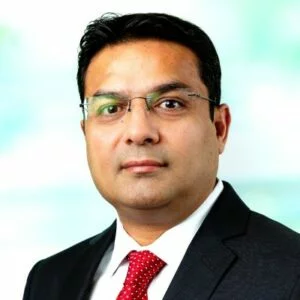
In the rapidly evolving world of healthcare technology, a key question on everyone's mind is the impact and the future of generative AI. In a recent interview with Bill Russell, Ben Patel, CIO for Cone Health, shares invaluable insights.

Patel begins by painting a vibrant picture of the current tech landscape. "Every technology is progressing at the same fast pace. No one technology is moving faster than the other," Patel points out. His emphasis on the importance of keeping up with all technological advancements, rather than focusing on a single one, reflects the dynamic and interconnected nature of the field.
This open-ended approach speaks to the growing interest in and importance of generative AI in healthcare. As Patel asserts, generative AI will not replace programmers; rather, it complements existing technical roles, from networking and cybersecurity to data management.
When queried about the relevance of education and choice of degree in a technology-focused career, Patel provides an intriguing perspective. "It is art and science. It's more, 80% people, 20% technology," he shares. The central takeaway is that, in this tech-driven era, one's passion and continuous learning may hold more weight than the specifics of a degree.
This doesn't downplay the importance of studying technology but instead emphasizes adaptability and constant learning – attributes vital in a world where generative AI in healthcare is becoming increasingly prevalent. The key, Patel suggests, is to focus on what one loves to do and never stop learning, as technological advancement is unrelenting.
Patel, who pursued his master's in computer science in 2003, reveals that he studied various programming languages, from COBOL to C#. He asserts, "When you study, you're studying concepts." This aligns with his broader perspective on education and technology, which focuses more on understanding concepts and evolving with technology rather than mastering a specific language or technology at a given time.
Moreover, Patel acknowledges the cyclical nature of technological evolution, highlighting Python's resurgence in recent years: "I still remember Python, towards the very end. It was one little assignment that we had to do in Python. And now I see that Python came back with a bang."
The conversation took an interesting turn when Russell asked about the relevance of studying economics for a career in technology. Patel, having never majored in economics himself, had a unique viewpoint to offer. He stressed the relevance of understanding the financial aspect, especially in senior roles like a CIO of a multi-billion dollar health system.
"In my journey, economics served me pretty well... dealing with budgets, understanding the financials of a billion-dollar health system. These are essential skills," Patel reflected. This underlines the multi-disciplinary nature of roles in healthcare IT and the need to grasp different facets of the business in addition to technology.
Generative AI, like any other technology in healthcare, cannot exist in a vacuum. It needs to be economically viable, understand the financial metrics that drive healthcare businesses, and ultimately contribute positively to the bottom line. This interconnectedness of economics and technology is a crucial aspect to consider in implementing and advancing generative AI in healthcare.
Patel's closing remarks revolved around the inevitability of change in the technological landscape, especially about generative AI in healthcare. He emphasized embracing chaos and adapting to the rapidly changing environment.
"What we're learning today will not be valid in five years. So you need to make sure that you are constantly learning and adapting," said Patel, encapsulating the essence of working in healthcare technology. This reflects the agility needed in the face of consistent change, particularly with the rapid progression of AI technologies.
The ability to embrace and adapt to change is a requisite for healthcare IT professionals. This is even more pronounced with the emergence of transformative technologies such as generative AI. As the healthcare sector continues to leverage AI, professionals who can ride the wave of change, constantly update their knowledge and skills, and adapt to new methodologies and technologies will thrive.
When Patel reflects on the role of generative AI in healthcare, it's clear that he envisions a future where AI is a tool, not a replacement. This is a crucial distinction as we move forward in the rapidly changing healthcare landscape.
As the healthcare field becomes more digitized and generative AI continues to evolve, its applications in healthcare are seemingly endless. But Patel's perspective is a reminder that AI is not here to take over roles but to enhance and streamline operations. This further underscores the importance of ongoing learning in this sector to stay current with advancing technology and harness its power effectively in the dynamic healthcare environment.
In conclusion, Ben Patel's insights reveal the complexity and dynamism of the technology landscape in healthcare and how generative AI is making an indelible mark in the field. It's a reminder that while technology evolves at an exhilarating pace, the constant threads remain: the power of learning, the importance of adaptability, and the recognition that technology is a tool to enhance human efforts, not replace them.


Questions about the Podcast?
Contact us with any questions, requests, or comments about the show. We love hearing your feedback.

© Copyright 2024 Health Lyrics All rights reserved